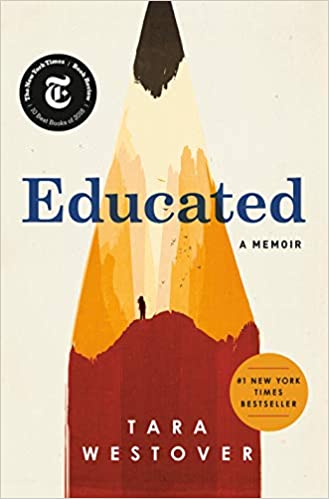I have to admit that I resisted reading Educated by Tara Westover when it came out with a big splash in 2018. I was, frankly, so done with the “homeschooling as child abuse” trope that I didn’t even bother picking it up.
But strange things happen in a pandemic, and one of those is you are sitting on the couch in the evening, having finished your latest book, scrolling through your mom’s Kindle account and you come across that book you resisted reading…
And so I read it, and was (perhaps not surprisingly) pleasantly surprised. Westover’s book does not promote the “homeschooling as child abuse” trope in the slightest. In fact, I would suggest that anyone who maintains that opinion read the book as a way to understand the difference.
On the fringe of the fringe
Westover was raised in an Idaho Mormon community in a family way at the fringe of the fringe of their community. Westover considers her father bipolar, though he has never been diagnosed. Whatever his diagnosis, he was clearly manipulative, paranoid, and delusional. Westover’s mother was both victim and then co-conspirator with her husband. The family maintained fragile ties with their more mainstream extended family and community, but they lived largely insular lives where the children had no idea what the outside world was like.
The psychological abuse and neglect from her parents stemmed from their extreme views: about the roles of women, about eschewing modern medical treatment, about blind obedience to the father’s authority. Another source of abuse was the constant psychological distress of living in a household that is constantly preparing for the end—which is always just around the corner. The physical abuse, however, came from an older brother. Himself a victim of their father’s paranoia and manias, the brother takes the “education” of his sisters into his own hands, his physical abuse stopping time and time again just short of murder.
The “homeschooling as abuse” trope would have you believe that this abuse was able to happen because of homeschooling. But throughout the story, Westover documents the complicity of relatives, neighbors, and their community. Homeschooling, it turns out, was neither a cause nor an affect of the abuse.
Through the support of a different older brother, who has escaped to college, Westover decides to “educate” herself. She eventually gains a high enough score on the ACT to go to college, and from there proves a brilliant student who can’t be kept back.
Is this homeschooling?
In some ways, Westover’s “education” at the hands of her parents was classic unschooling. Her mother taught all of the children the basics of the three R’s, and both parents gave them life lessons. Her father put the children to work in his (physically dangerous) business and enlisted their support for his constant preparations for the end of days. From a young age, Westover also acts as assistant to her mother’s (illegal) midwifery and then her highly successful essential oils business.
Since unschooling focuses on releasing children from the tyranny of standards and curriculum so that they can pursue their own passions and do meaningful work, one could argue that Westover was “unschooled,” albeit unconventionally.
However, this is not Westover’s view or mine. What happened to her was not unschooling, but baldfaced neglect. She entered the world only with the skills that she fought for. She often had to hide her studies from her domineering father and her passive or enabling mother. She was lucky to have mentors in her college-bound brother and a friend in town. Any resemblance her education has to unschooling is only on the surface.
The village raised the child
Westover’s story, in the end, isn’t about homeschooling at all. In fact, she makes a point of noting other homeschooling families in her extended family who are giving their children a real education.
Her story is about the strength of the human spirit, the importance of believing in factual truth, and perhaps most of all, the role of “the village” in raising children. Westover’s father’s manias and her brother’s abuse make her family an outlier in some ways. But in other ways, her story is a classic one: what her immediate family couldn’t give she got from others.
An older brother acted like a parent.
A friend in town acted like a brother.
A college administrator recognized a need to meet her where she was.
A roommate patiently educated her in the ways of the world.
As much as Westover’s father believed that it was his family against the world, it was the world that made sure that his neglected children could thrive.
A final rift
There is one sad theme to the book that feels unresolved. Near the end of the story, Westover muses about the fact that her siblings who “got out” are successful, with PhDs and lives in the mainstream. The children who stayed, without even a high school diploma, are still fully within their parents’ sphere of influence, their choices limited.
Westover realizes that this rift forces her to choose between her education and the myths her family survives on. Like many survivors of abuse and growing up in extremist communities, she has to choose between fact and family, a break or a continuation.
In the interview linked below, she draws a connection between the choice she made and our current political environment. It’s worth a read.
The ultimate homeschooler?
Westover’s education didn’t come from homeschooling. But in another way, Westover is the ultimate homeschooler—despite her parents’ influence. She took ownership of her education and her life, a process that is difficult for teens even in the most supportive families. She educated herself, then she let herself be educated.
This isn’t a book about homeschooling, but it is a book about learning, perseverance, and coming to terms with family. It’s well worth a read.

